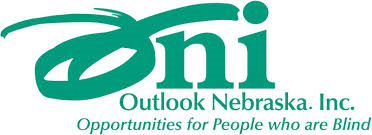Audio Description (AD) makes visual images accessible for people who are blind or have low vision. Using words that are succinct, vivid, and imaginative, media describers convey the visual image from television and film that is not fully accessible to a significant segment of the population (more than 21 million Americans experience significant vision loss). American Council for the Blind “The census puts it around 15,000 in the Omaha metro area with 35,000 statewide.”, says Lisa Kelly, Life Enrichment Director at Outlook Nebraska.
Audio Description is also available for live performances as well. Audio Describers are trained through Outlook Nebraska whose Mission is “To positively impact everyone who is blind and visually impaired. We do that by creating employment opportunities, offering technology training to build skills supporting self-sufficiency, offering accessible recreational and cultural activities, and educating community members and business leaders about blindness to help create a more inclusive community.” Each department at Outlook Nebraska has Visually Impaired people working in them.
The United States does not have a formal Audio Description Degree Program, so each city wanting to provide this service must design its own training. Outlook Nebraska, through their Life Enrichment Program, hosted a training in August, 2018 with 8 people from the Omaha area participating. The training, over three sessions, involved, an introduction activity about Visual Impairments, practice describing photographs, learning how to research and write a preshow, practice describing performances on video, and listening to the described performance of Oliver! at The Lofte Theatre while being sleep shaded for the first act, then watching and listening during the second act. The final session will require each Describer to describe part of the movie Roman Holiday for an audience of Visually Impaired people at Outlook Nebraska.
This training was organized by Lisa Kelly, Enrichment Programs Developer for Outlook Nebraska. Bekah Jerde, Assistant Director for Radio Talking Books and Donna Hultman, Consultant for Nebraska Educational Services for the Blind and Visually Impaired lead the training. Both women were part of Outlook Nebraska’s original audio describer training in 2016. Since then they have adapted the original training to offer an Outlook Nebraska training each year.
An Audio Describer has to prepare for the show they will be describing. They usually preview the show to understand plot, character, set, costumes and special props. About 15 minutes before the show starts the Describer will do a preshow that helps set the scene for the Visually Impaired audience members by describing the set, scene changes of the play, scene changes related to characters, character names, costumes, background for the show or interesting director’s notes, key props, and lighting changes. During the show, the Describer provides commentary, through a stenographer’s mask, about the characters, who is speaking, the action, set changes, costumes, props, and anything that is important to the show’s plot and the audience members use a special earphone to listen to the Describer.
A VIP (visually impaired person) wanting to have a show described, contacts Outlook Nebraska which provides the Describer and the equipment. The VIP must buy their tickets and obtain the transportation necessary. “Currently, Outlook regularly promotes the Broadway productions at the Orpheum as well as main stage productions at the Omaha Community Playhouse, the Blue Barn Theatre, Circle Theatre, the Rose, the Lofte Theatre, and UNO as well as Nebraska Shakespeare. They also make audio description available for monthly classic movie nights at Outlook Nebraska, specific requested films at Filmstreams, and productions at the Lied Center for the Performing Arts in Lincoln, art exhibits at the SAC Museum, hockey games at the Ralston Arena, and baseball games. Since 2016 Outlook has offered almost 100 audio described events. So far roughly 166 patrons have utilized the service. The Lofte Theatre had 39 Visually Impaired People attend the described performance of “The Miracle Worker” last spring. Since last fall (2017) Omaha Community Playhouse has designated shows described using their own in house equipment and hires their own describers or trained members of their staff, but Outlook continues to support these shows through providing braille programs and $7 tickets to members of the visually impaired population.”, says Lisa Kelly.
Kelly adds, “Audio description is now required by the Americans with Disabilities Act as a service available upon request “when feasible” (which is generally thought to be a minimum of two weeks’ notice.) Most theatres explain on their home page under “Accessibility” how a patron should request the service if a specific performance has not previously been designated for Audio Description. Any theatre or patron can call Outlook Nebraska to request audio description for any event, however, 1-2 previews is generally required to prepare the description. One-time shows and events are only offered when requested and with the understanding of no prior preparation on the part of the describer. For the past two years Outlook’s Audio Description program has been funded by a grant from the Nebraska Enrichment Foundation. Outlook charges theatres a minimal fee to provide audio description services for a performance and only if patrons have purchased tickets. Many people losing their vision are not aware of the service even being available at local movie theatres and on live and streamed TV such as Netflix.”
Audio Describer Training

